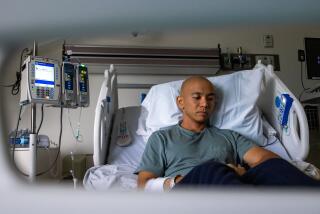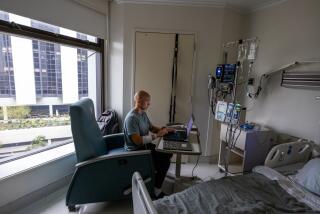Parents Race Against Time, Superstition to Help Baby : Leukemia: Some Asians, who are most likely to match her marrow type, are afraid to be donors.
- Share via
After 10-month-old Amanda Chiang was found to have acute leukemia, her parents went on a search for a compatible bone marrow donor who might help treat the child.
But the Sacramento family ran into a hurdle. There is a greater likelihood of finding a matching donor among their own ethnic group, but some Chinese-Americans believe that they will lose their souls if they participate in a transplant.
To get around the cultural barrier, the Chiangs have avoided querying superstitious first-generation immigrants and have moved a younger, more sympathetic, group of Asian-Americans to participate in donor drives across the state. A fund-raiser and donor drive have been scheduled in Los Angeles.
The hurdle the Chiangs face now is the non-cultural matter of raising money.
Doctors say that a search for a cell tissue type that matches Amanda’s may require expensive blood tests of 15,000 donor candidates. The cost of each test is about $75.
Amanda’s mother, Heddy Chiang, said the family has had more than 1,400 blood samples tested at a cost of about $100,000. Chiang manages a small family furniture store, and her husband, Joseph, is a computer software specialist working for the state Legislature.
“It’s so frustrating,” she said from her daughter’s hospital room at the UC Davis Medical Center in Davis. “Medical insurance covers the transplant but not the donor search.”
Last week the infant was in serious condition with complications associated with chemotherapy, Dr. Charles Abildgaard said. After she suffered from a bacterial infection in her lungs, the baby’s condition stabilized earlier this week, he said.
But the child’s health is fragile, Heddy Chiang said.
And the rush to find a donor has become frantic. She said doctors have told her the baby needs the marrow transplant as soon as possible. Amanda’s leukemia was diagnosed in April.
People of the same race have greater similarity of tissue makeup, Abildgaard said. Leukemia is a cancer of the blood-producing cells in the bone marrow.
“You increase the chances of finding a match by looking among people with a similar background,” he said. “Probably Chinese would be more likely to produce a match than other Asian groups.”
Although leukemia is a worldwide disease, with no differences as far as the number of incidences among races, the marrow transplant treatment has some “racial dependency,” Abildgaard said.
Initially, the family had trouble getting Asians to consider giving blood samples for testing.
“The first thing the older, first-generation Chinese will say is ‘don’t even ask,’ ” Chiang said. “The way they think, if something bad happened to me, I must have done something wrong. If they give their blood, they think the bad will go to them.”
Kingman Kan, director of the Asian outreach project for the National Marrow Donor Registry Program, said, “Part of the old, old Chinese superstitious belief is when you die and are buried you must be buried as a whole. The idea of a transplant is what bothers people.
“What we need to do is change the term to transfusion, so older Chinese don’t misunderstand and think they are losing a part of their soul.”
About 80% of the donor candidates who have already come forward are college students and the rest are mostly young parents, Chiang said.
“Some are like us, with a baby,” she said. “The parents say that they are frightened by the thought that it could happen to them.”
Donors’ tissue types will be on file in a National Marrow Donor Registry based in St. Paul, Minn., she said.
“The Asian additions to the registry make it so (that) families like us won’t have to go through what we are. Oh, I can’t tell you what hell it is,” Chiang said.
A group of local supporters plans a benefit dance at the Los Angeles Bonaventure Hotel Nov. 13 and a donor drive downtown Nov. 19.
More to Read
Sign up for Essential California
The most important California stories and recommendations in your inbox every morning.
You may occasionally receive promotional content from the Los Angeles Times.












